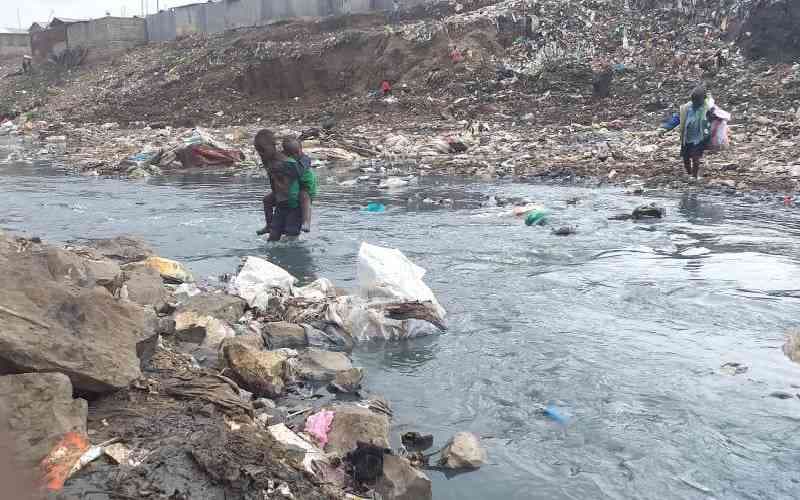We're loading the full news article for you. This includes the article content, images, author information, and related articles.
Over 80,000 residents in Nairobi's Mukuru Kwa Reuben informal settlement now have access to a new, simplified sewer system, a development expected to significantly improve public health and sanitation in the densely populated area.

Residents of Mukuru Kwa Reuben are experiencing a significant improvement in sanitation following the connection of over 80,000 people to a new, low-cost sewer system by the Nairobi City Water and Sewerage Company (NCWSC). This initiative aims to curb the spread of sanitation-related diseases and eliminate the flow of raw sewage that has long plagued informal settlements in Nairobi.
Martin Nang'ole, the Acting Managing Director of NCWSC, stated on Wednesday, October 23, 2025, that the simplified sewer system has already connected 200 households in Mukuru Kwa Reuben, laying approximately 3.9 kilometres of sewer line. He highlighted a positive outcome of the new system, noting that no cholera cases have been reported in the connected areas over the past two years.
Mukuru, one of Nairobi's largest informal settlements, is home to an estimated 400,000 people across approximately 100,560 households, occupying 689 acres. For decades, residents have grappled with inadequate water and sanitation infrastructure, often relying on informal water vendors and shared pit latrines. These conditions led to frequent outbreaks of waterborne diseases like cholera and typhoid.
In 2017, the Nairobi City County Government declared Mukuru Kwa Njenga, Kwa Reuben, and Viwandani a Special Planning Area (SPA). This designation paved the way for the Mukuru Integrated Development Plan (MIDP), which seeks to upgrade living standards and provide essential services. The land in Mukuru is largely privately owned, a factor that historically complicated government intervention in infrastructure development.
Kenya's Vision 2030 aims to achieve 100% access to improved water and sanitation for all Kenyans by 2030. The Kenya Environmental Sanitation and Hygiene Policy (KESHP) 2016–2030 outlines strategies for both rural and urban sanitation, including the expansion of sewerage schemes in urban areas and the promotion of public-private partnerships. The government has also committed to increasing public investment in sanitation and hygiene.
The Mukuru sewer line project is a collaborative effort involving the NCWSC, Water and Sanitation for the Urban Poor (WSUP), and the Athi Water Works Development Agency (AWWDA). Community-based organisations are also being trained to manage and maintain parts of the system, fostering local ownership and sustainability. Residents previously paid exorbitant fees for water from informal suppliers, often 400-800% more per cubic metre than official county rates, and faced charges for using public latrines.
The simplified sewer system, which uses smaller, flexible pipes laid at shallower depths, is cheaper and quicker to install than conventional sewers. This innovation is crucial for extending sanitation coverage in Nairobi's informal settlements, where approximately 60% of the city's population resides on just 2.6% of its land. The lack of safe sanitation perpetuates a cycle of disease and poverty, making such interventions vital for public health and economic well-being.
While the initial phase has shown positive results, the long-term sustainability of the simplified sewer system will depend on continued community engagement and effective maintenance. The project's full cost, estimated between KES 40 million and KES 50 million, is yet to be fully expended. The challenge of providing plot-level toilets connected to the sewer system remains, with approximately 80% of Mukuru residents still lacking this access.
The NCWSC plans to connect at least 2,000 households to the system over the next two years, alongside efforts to improve access to clean water. The company is also installing prepaid water dispensers, with 13 already in place, allowing residents to access water using tokens.
The expansion of the simplified sewer system to other parts of Mukuru and other informal settlements will be a key indicator of its success. Monitoring the long-term impact on public health, particularly the incidence of waterborne diseases, will be crucial. The continued collaboration between government agencies, non-profits, and local communities will be essential for the project's sustained impact.
Keep the conversation in one place—threads here stay linked to the story and in the forums.
Other hot threads
E-sports and Gaming Community in Kenya
Active 8 months ago
The Role of Technology in Modern Agriculture (AgriTech)
Active 8 months ago
Popular Recreational Activities Across Counties
Active 8 months ago
Investing in Youth Sports Development Programs
Active 8 months ago